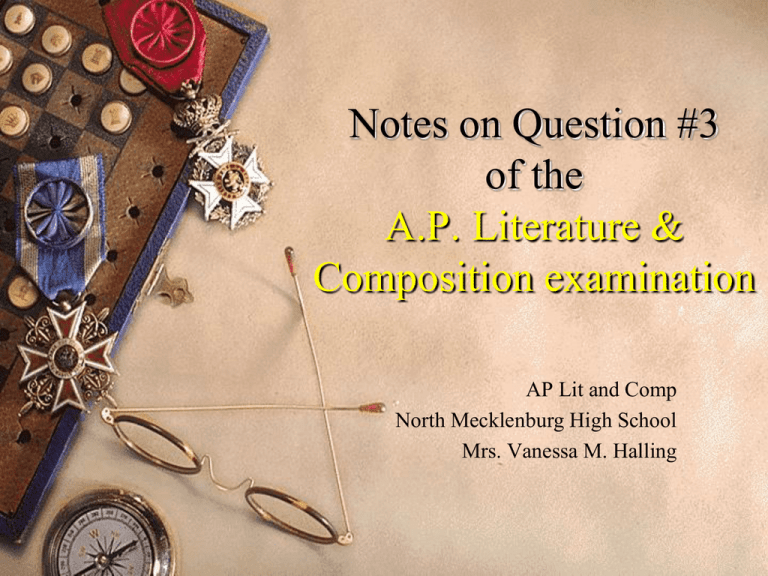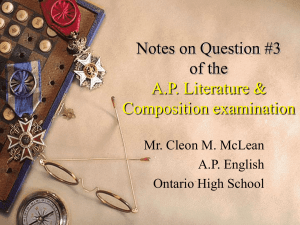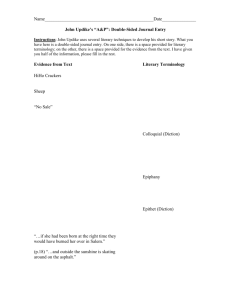PPT - Writing the Third AP Exam Essay
advertisement

Notes on Question #3 of the A.P. Literature & Composition examination AP Lit and Comp North Mecklenburg High School Mrs. Vanessa M. Halling Focus The essay should be analytical, not declarative, i.e., do not TELL the reader. Rather, SHOW the reader via explanations and examples. You must alternate between concrete details from a work or passage, and your commentary. Explain the use of literary devices • Remember that a literary device or technique is not the focus of your essay; rather, it is the meaning of the work or passage that should be your focus. Simply telling the reader where the literary device or technique appears will be of no value or interest. Instead, work towards explaining HOW and WHY the author employs certain literary devices and/or techniques. Explain the use of literary devices continued • Do not name literary devices and/or techniques in your introductory paragraph, since this oftentimes leads to an essay full of lists rarely in the service of analysis. • Discussions of diction should lead to a serious and apt connection to your analysis. In discussion of a poet’s diction, mention an alternate choice that would have weakened the phrase. • Unfortunate example: “He uses effective diction here, including words like “fall” and “shake” • A more fitting example: By employing words such as “fall” and “shake,” the poet alludes to the resounding (biblical) fall of man. Such seemingly simple diction evokes a poignant response from the reader . Waste • Avoid giving your essay a title; it is quite frankly a waste of precious time. • Avoid long introductions, especially the funnels which begin far out in the cosmos, i.e., “Since the dawn of time, writers have used certain literary techniques to elicit particular responses from their readers.” There is almost no way of digging out of this black hole. Waste continued • Avoid judgments. The essay questions will not ask for you to make a judgment, so do not waste your time giving them. Most judgments sound foolish, anyway, even if they are only one word long. E.g., “Shakespeare skillfully moves Hamlet into…” (DROP “skillfully.”) • “These things make “Equus” a great play that people will enjoy for years to come.” (DROP THE WHOLE SENTENCE!!) Even more waste… • DO NOT use a sentence to identify a word or a phrase as an example of a literary device or technique. E.g., “When the poet says “the trees have a face,” she is using personification. • Correction: The poet personifies the trees to show… Quotations • Keep quotations from the passage or the work as short as possible. One word or one line is often enough. The essay graders/readers have the passages in front of them. A full sentence is nearly always too much by far. Diction • Avoid vague language. Use specifics rather than general terms like “positive” and “negative” • Avoid using the meaningless words “certain” and “particular” (except where “certain” means confident, or “particular” means exacting). If you are unsure of the meaning of a word, go the conservative route and just leave it out…your task is not to bewilder the reader with awkward diction. • Avoid using the phrase “is when,” especially in a definition Diction, continued • Avoid the word “incredible” and “unbelievable,” even when you’re using them with their real meanings. • Be logical with the word “both.” • An unfortunate example: “The two poems both contrast with each other.” DROP THE WORD “both” • Avoid the word “quote.” • An unfortunate example: “‘…when Horatio quotes “The rest is silence.”’ Mechanics (grammar, spelling, and punctuation) • Use the apostrophe correctly. Missing or unnecessary apostrophes are the most common mechanical errors. They are annoying errors because the reader often has to back up and start the sentence again. • Underline titles of novels; use quotation marks around titles of poems, plays, and short stories. Forty to fifty percent of papers graded used neither, and, of course, this is to the writer’s disadvantage. With works such as Macbeth, and Hamlet, in which characters also share the name of the title, confusion will abound if titles are not underlined or placed between quotation marks. Mechanics, continued • DO NOT write in pencil. While you do not lose points for writing in pencil, it is quite likely that you can lose points when readers lose track of your ideas while pausing to decipher a word. Also, essays written in pencil tend to show multiple other weaknesses.





